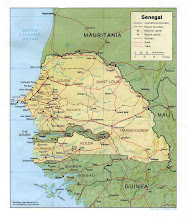Senegal nurtures its role as a financial hub for West Africa. A smart move, leveraging its stability. Over the past year of so Islamic financial players are also focusing on Senegal, and vice versa. Indicative of the trend was a forum convened last year SYM International Finance Corporation, in partnership with the Government of Senegal, to assist the Government of Senegal to promote the a Financial Services Center and attract more private investments.
But recent unrest--and actual violence--in Senegal over the legislative power play by President Abdoulaye Wade undermine the county's reputation of stablity, and raise investment concerns. Many have wondered whether the civil disturbances will undermine Senegal's reputation of consistent democratic traditions.
Those concerns are also reflected in the $500 million Eurobond placed this year by Senegal's government. Senegal is rated B+ by Standard & Poors and B1 by Moody’s. When the riots earlier this month were occuring, Senegal’s Eurobond yield was up 4 basis points at 8.215 percent and the price was down 1/4 point at 104.5.
The riots reveal two challenges to Senegal's newfound international finance role. The first is the energy crisis. Power outages are at the root of the civil discontent. But politics plays a companion role. The presidential elections next year are roiling right along with the power woes. Both are concerns that will not go away soon.
Wednesday, June 29, 2011
Thursday, June 16, 2011
IMF: Energy crisis saps one percent of GDP
According to a just-released "county report" by the International Monetary Fund (IMF), Senegal's energy crisis is seriously shorting its economy. According to the report:
"Capacity constraints, frequent electricity outages, high production costs and electricity tariffs, and poor governance of the energy sector have increasingly constrained economic development. The authorities’ analysis suggests that energy supply problems have reduced real GDP growth by more than 1 percent per year during the past two years."
Senegal's government has an active plan to reform the energy sector, according to the report:
"The authorities’ reform plan (TAKKAL), includes (i) short-term emergency measures that complement medium-term investments (including recapitalization of the national electricity company SENELEC and renting of additional generating capacity (partly used to allow for the upgrading of existing power plants)); (ii) increasing the electricity supply by changing the production mix, acquiring mobile power units, and accelerating the construction of a coal power plant; (iii) demand management policies; (iv)structuring of SENELEC to achieve its financial viability; and (v) creating a communication strategy to ensure transparency and good governance of the reform process.
Financing needs: The total cost of energy sector reform for 2011–15 is estimated at some US$ 1.5 billion (more than 10 percent of 2011 GDP). Financing needs in 2011 alone amount to more than 3 percent of GDP. The analysis of a reputable private sector consultancy shows that the investment package is highly profitable."
An American company, APR Energy Ltd., is one of the key players in this program. After significant investment by former Secretary of State Madeleine Albright and capitalist George Soros, the company was purchased this week by U.K. financier Hugh Osmond's listed cash shell Horizon Acquisition Co. PLC. The company supplies "rental power."
"Capacity constraints, frequent electricity outages, high production costs and electricity tariffs, and poor governance of the energy sector have increasingly constrained economic development. The authorities’ analysis suggests that energy supply problems have reduced real GDP growth by more than 1 percent per year during the past two years."
Senegal's government has an active plan to reform the energy sector, according to the report:
"The authorities’ reform plan (TAKKAL), includes (i) short-term emergency measures that complement medium-term investments (including recapitalization of the national electricity company SENELEC and renting of additional generating capacity (partly used to allow for the upgrading of existing power plants)); (ii) increasing the electricity supply by changing the production mix, acquiring mobile power units, and accelerating the construction of a coal power plant; (iii) demand management policies; (iv)structuring of SENELEC to achieve its financial viability; and (v) creating a communication strategy to ensure transparency and good governance of the reform process.
Financing needs: The total cost of energy sector reform for 2011–15 is estimated at some US$ 1.5 billion (more than 10 percent of 2011 GDP). Financing needs in 2011 alone amount to more than 3 percent of GDP. The analysis of a reputable private sector consultancy shows that the investment package is highly profitable."
An American company, APR Energy Ltd., is one of the key players in this program. After significant investment by former Secretary of State Madeleine Albright and capitalist George Soros, the company was purchased this week by U.K. financier Hugh Osmond's listed cash shell Horizon Acquisition Co. PLC. The company supplies "rental power."
Monday, June 6, 2011
IMF cites energy and debt, but generally good health of Senegal's economy
The International Monetary Fund's recent review of Senegal's economy has some interesting observations. Following the Executive Board’s discussion on Senegal, Ms. Nemat Shafik, Deputy Managing Director and Acting Chair, stated:
“Senegal’s economic recovery continues, and performance under its PSI-supported program is satisfactory. There are however downside risks stemming mainly from continued electricity supply problems and increasing food and fuel prices, which pose some inflationary risks.
“With the emergence of critical investment needs in the energy sector, fiscal policy faces the challenge of accommodating additional priority expenditure while maintaining debt sustainability. Although there is some space for temporarily higher fiscal deficits, a substantial contribution will need to come from additional revenue measures and reprioritizing expenditure. In the medium term, fiscal consolidation, supported by a prudent approach to borrowing, will be critical to bring down the deficit to levels consistent with preserving debt sustainability. The recent issuance of the Eurobond to finance infrastructure projects should be accompanied by strengthening investment planning and debt management.
“To sustain the growth momentum and increase Senegal’s growth potential, the pace of structural reforms should be accelerated. This includes tax policy reforms aimed at broadening the tax base and increasing the revenue effort, energy sector reforms, financial sector reforms, and other reforms geared towards removing bottlenecks to growth and promoting an improved business climate and governance,” she added.
“Senegal’s economic recovery continues, and performance under its PSI-supported program is satisfactory. There are however downside risks stemming mainly from continued electricity supply problems and increasing food and fuel prices, which pose some inflationary risks.
“With the emergence of critical investment needs in the energy sector, fiscal policy faces the challenge of accommodating additional priority expenditure while maintaining debt sustainability. Although there is some space for temporarily higher fiscal deficits, a substantial contribution will need to come from additional revenue measures and reprioritizing expenditure. In the medium term, fiscal consolidation, supported by a prudent approach to borrowing, will be critical to bring down the deficit to levels consistent with preserving debt sustainability. The recent issuance of the Eurobond to finance infrastructure projects should be accompanied by strengthening investment planning and debt management.
“To sustain the growth momentum and increase Senegal’s growth potential, the pace of structural reforms should be accelerated. This includes tax policy reforms aimed at broadening the tax base and increasing the revenue effort, energy sector reforms, financial sector reforms, and other reforms geared towards removing bottlenecks to growth and promoting an improved business climate and governance,” she added.
Subscribe to:
Posts (Atom)


